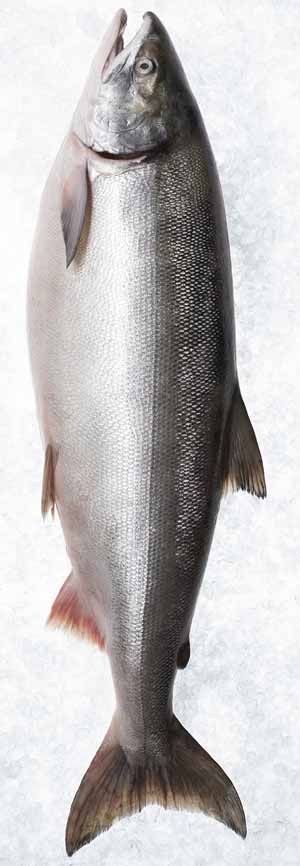OUR FISH - BENEFITS
Health Benefits of Salmon 
We all know salmon is “good for you,” so what are the specific benefits of eating salmon on a regular basis?
Good for Your Heart: Countless studies over the past 30 years have shown conclusively that eating a diet rich in fatty fish is associated with cardiovascular health. This benefit was quantified in a 2006 report released by the Harvard School of Public Health: “Fish consumption lowers the risk of death from heart disease by 36 percent,” researchers found. In addition, the frequent consumption of oily fish (such as salmon) “reduces total mortality by 17 percent,” the report concluded.
Brain Food: New, emerging research into the impact of consuming Omega-3s (EPA and DHA) suggests a correlation between consuming Omega-3s during pregnancy and fetal brain development. In fact, today, nearly all prenatal vitamins contain DHA, which is now required as a nutritional supplement in infant formula.
The Eyes Should Have It! Visual acuity—the ability to see better—is now known to be associated with a diet high in Omega-3s which are found in abundance in wild Yukon River salmon.
Good for Your Mood: Long-term studies conducted by the National Institutes of Health suggest a strong positive correlation between fish consumption and positive social behavior. Lack of seafood consumption has been linked to behavior and mood disorders.
Immune System Booster: Seafood consumption has been linked with a strong immune system. Experts believe that Omega-3s and Vitamin D in fish such as salmon contribute to this finding.
Diabetes, Cancer, and other Chronic Illnesses: While research into these diseases and conditions is still in its infancy, some researchers now believe that seafood consumption and a diet high in Omega-3s can protect against certain chronic illnesses and conditions.
fish oil VS Salmon
In themselves, omega-3 fatty acids [from fish oil capsules] are not enough—you need to eat fish. Edell Elvevoll, Ph.D., University of Tromsø, Norway.
 While the food industry has jumped on the Omega-3 bandwagon by offering a wide array of foods fortified with Omega-3s, and fish oil manufacturers promote taking fish oil capsules as a “magic bullet,” the fact is, as Dr. Elvevoll points out, “you need to eat fish.”
While the food industry has jumped on the Omega-3 bandwagon by offering a wide array of foods fortified with Omega-3s, and fish oil manufacturers promote taking fish oil capsules as a “magic bullet,” the fact is, as Dr. Elvevoll points out, “you need to eat fish.”
Why? To cite from Dr. Elvevoll: “Seafood is rich in antioxidants, fat-soluble and water-soluble vitamins, easily digestible proteins with special amino acid composition, minerals, trace elements, and fat of the healthy, polyunsaturated type.” In Dr. Elvevoll’s groundbreaking research she states “We have carried out a clinical study that shows the uptake of Omega-3 is three to four times greater from salmon fillets than from fish oil.” She cites an earlier study in Italy that showed “an even greater difference in favor of salmon compared to concentrated dietary supplements,” and concludes, “therefore, we consider it best to eat seafood in its natural form.”
Other research shows that just a small serving (100 g. or 3.5 oz.) of Yukon River salmon not only delivers the same amount of Omega-3s as 10 average-potency fish oil capsules, but also 50 percent of the recommended daily allowance of Vitamin D. This so-called “sunshine vitamin” is now associated with bone health, brain function, and the prevention of certain immune diseases.
In addition to Vitamin D, wild salmon contain taurine, which Dr. Elvevoll and others cite as one of the elements that contributes to the cardiovascular benefit of eating seafood.